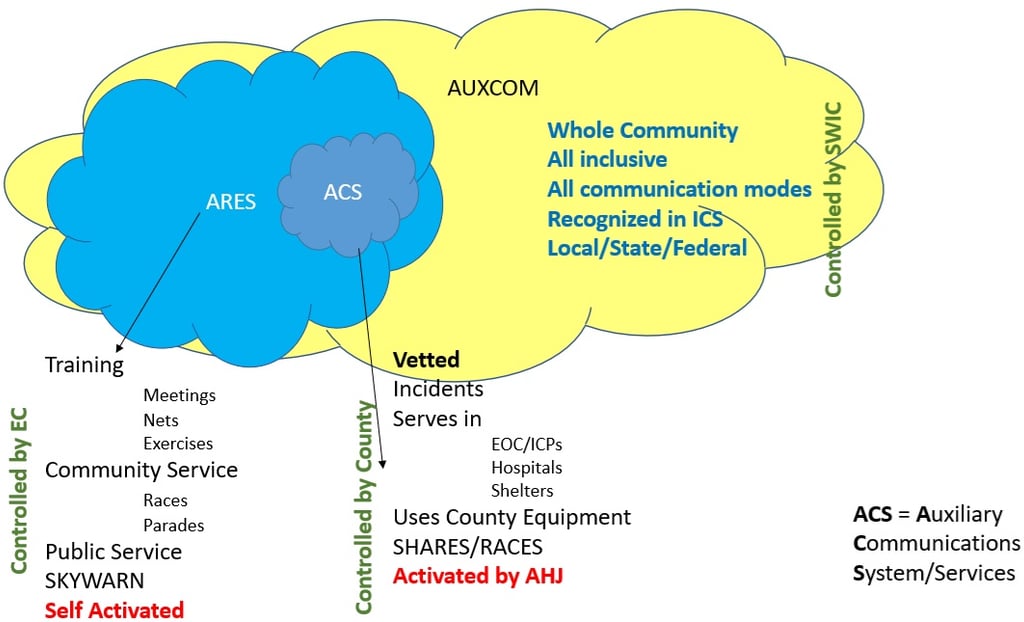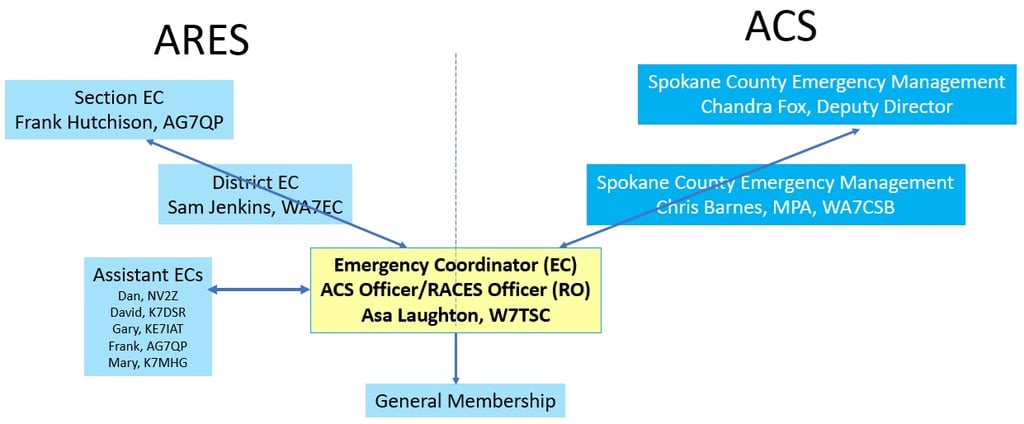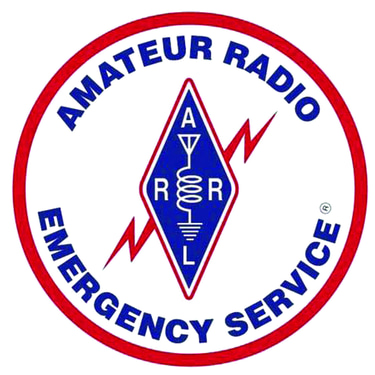New Member Orientation
Designed to jump start your ability to positively contribution to the mission of Spokane County ARES and ACS by understanding their mission, structure and the means available to you.
Topics Covered
Introduction
Many years ago I was given a cassette tape of a presentation by a Navy Captain entitled, "Care and Feeding of Recruits." This Captain described the experience of a recruit fresh out of Boot Camp who arrives at his ship on a Friday evening - and who was basically ignored until Monday morning - and how he eventually ended up being discharged months later with neither the Navy or the sailor winning in the situation.
I realized that new members to ARES and ACS were being treated the same way. We are delighted that you joined and almost immediately wonder why you're NOT already qualified with a full understanding of how ARES/ACS operates, why we operate as we do, who we report to, or even something as simple as how you get the training necessary to qualify.
This page and the accompanying class, usually held the 4th Tuesday of each month stating at 1800 or 6:00 PM at the DEM, 1121 W. Gardner Ave, Spokane, WA 99260, are designed to address the questions of why, what, and how.
Spokane County EmComm Organizations
There are two EmComm organizations in Spokane County - Amateur Radio Emergency Service (ARES) and the Auxiliary Communication System (ACS). People also speak of AUXCOM. What are the relationships between these organizations?
This figure may give you an idea of the relationships:


ARES and ACS operate in similar fashion - often you can't tell which is which because they do many of the same things. The critical difference is that ACS members have undergone a background check and can therefore operate in Emergency Operation Centers (EOC), Incident Command Posts (ICP), hospitals and shelters - areas where you will handle sensitive information. Another difference is that ACS is activated by the Agency Having Jurisdiction (AHJ) - Spokane County Emergency Management, while ARES can serve at community events, hold training events, support the National Weather Service without approval from anyone.
Finally, there is AUXCOM - Auxiliary Communications. This is a FEMA designation for those who have met the requirements to be an Auxiliary Communication operator (AUXC) within the Communications Unit of the Incident Command Structure (ICS).
Qualifying
Many people wonder why there is "qualifying" for amateur radio operators - after all, we have been licensed by the FCC and for decades Amateur Radio has been offering amazing service in times of need and disaster. That's all true, but because of events in the early 2000's, many organizations realized that to be truly effective in service to AHJs and Non-Govenment Organizations (NGO) Amateur Radio operators need to know more:
- We need to know how they expect us to support them
- We need to know how the service AHJs and NGOs function
- We need to know to how use the AHJ's equipment
- We need to know to use all the capabilities available for successfully passing information
Position Task Books (PTB) declare what knowledge, skills and experience are required to reach specific levels. They are are also used to document your progress toward qualifying. The key characteristic is you have to demonstrate that you have accomplished each item by obtaining a certificate of completion for courses or a signature from an authorized evaluator for skills and experiences. Click on the here for guides for the ARES PTB and the ACS PTB.
Lastly, if you want to learn more and learn faster, then Volunteer! Seek activities to actively participate. Don’t wait to be asked, instead “Ask what I can do?” Because it’s the relationships you develop while working with others that will be most important in an emergency. As one wag said, "An emergency is a poor time to be handing out business cards."
Useful Information and Aids
Field Operating Guides (FOGs) - These documents contain a wealth of information useful in the field and at home. These can be downloaded as PDFs or as smartphone apps from your phone's app store - they are free.
Auxiliary Communications Field Operating Guide (AUXFOG) - PDF Link
National Interoperability Field Operating Guide (NIFOG) - PDF Link
Spokane County ACS Field Operating Guide (ACSFOG) - Available as a half page size and full page size from the Spokane County Groups.io account along with instructions on how to install the PDF on your smartphone.
Register with Alert Spokane, and maintain current information - Alert Spokane is based on the smartphone app Code Red. Load Code Red on your smartphone and configure it for your local area.
Maintain personal preparedness kit - Prepare and maintain a Personal Preparedness Kit. Personal items you would need to sustain yourself during a deployment, including food, water, hygiene, clothing, medication, etc. The expectation is you will be able to operate in some type of shelter, so you do not need to have personal shelter (but may). You are otherwise expected to be fully self-sufficient for the duration of an activation/deployment. As a minimum, you are expected to have a 24-hour kit but having a 72-hour kit is preferred.
Maintain a radio deployment kit - Prepare and maintain a Radio Deployment Kit. Everything needed to do your duties as an amateur radio operator when deployed. Radio(s), spare batteries, antenna, coax, connectors, small tools, etc. This will vary individually based on your license class, type(s) of radio(s) you have. It should support 24 to 72 hours of operation. Some measure of portable power should be included. At a minimum, you should be able to operate on 2 meter and 70 cm for 24 to 72 hours. In addition, having the capability to operate on HF bands (80/60/40/20 m) and digital modes (Winlink/FLDigi) is encouraged.
ICS Forms Collection - These are the forms used by ICS compliant organizations for collecting, processing, and passing information as well as the planning and executing of operations. Not all are needed but you should be aware of them. The ICS-214a (personal log), ICS-214 (Group Log), ICS-213 (Message Form), ICS-213RR (Resource Request Form) and ICS-309 (Communications Log) are the minimum you should keep in your go kit.
Hands On Training (In class and scheduled during workshops, exercises, training meetings)
Spokane County Comm Room and Trailer - A tour of the Comm Room will follow the class and include participation in the Weekly ARES/ACS net at 2000 or 8:00 PM. Familiarization is normally conducted during workshops and exercises.
Spokane County Equipment - This includes equipment in the Comm Room, Comm Trailer, the Mobile Network Units (MNU), hospitals and caches. Familiarization is normally conducted during workshops and exercises.
Complete First Aid/CPR training - This training can be scheduled through Spokane County Emergency Management. Members will be informed of upcoming classes via email notifications or announcements on the weekly net. Certification is good for two years.
Spokane County Defensive Driving - This is optional and not all will be accepted. Completion of this training and acceptance by Spokane County Emergency Management is required in order to operate county vehicles. This training can be scheduled through Spokane County Emergency Management. Members will be informed of upcoming classes via email notifications or announcements on the weekly net.
Field Programming a HT - Bring your HT and its manual. You need to be able to manually (through the keypad) program a frequency, offset and tone on the HT and save it to memory. There are cheat sheets for some radio models here.
Winlink - In the New member Orientation class, there will be a brief overview of what Winlink - Email over Radio - is and how to get started. There is a 2nd Saturday Winlink Workshop from 1230-1530 (12:30 PM to 3:30 PM) for additional help and instruction. There is an introduction here.


EmComm
Your source for emergency communication information in the Inland Northwest.
Administrator
Frank E Hutchison
AG7QP/WRDI529
509-434-4880
© 2025. All rights reserved.
